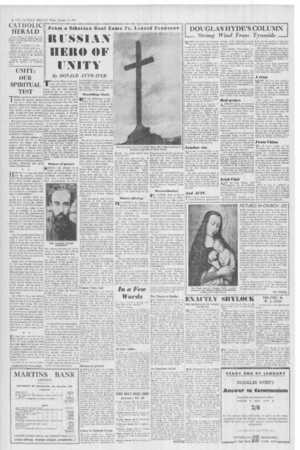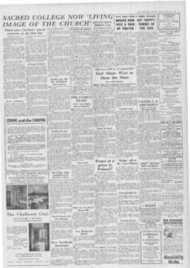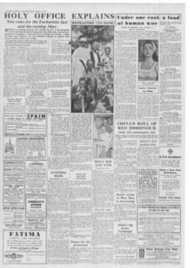Page 4, 16th January 1953
Page 4

Report an error
Noticed an error on this page?If you've noticed an error in this article please click here to report it.
Tags
Share
Related articles
The Redeemer Of Man
Apostolate For All Every Day
Who Sinned First, Anyway? A Look At The Original Blame
Theology
Modern Prophets
RUSSIAN HERO OF UNITY
By DONALD ATTWATER
HE divine Word of God be came man that man's Fall might be reversed; but as we know only too well, redeemed mankind did not automatically lose its tendency to evil. The spirit of contradiction, of separatism, of particularism was to be found among Christians from the first.
Some of us too easily assume that disunity came only with the Protestant Reformation, that before that revolution in Western Europe the religions unity of Christians was for practical purposes universal and unimpaired. It was quite otherwise. The devastation of Arianism was no doubt repaired; but already in the fth century the church of Persia and Mesopotamia, soon to be followed by the church of Egypt and much of Syria, and then the church of Armenia, separated themselves from the Universal Church, and they have not yet returned. Four hundred years before Martin Luther was born, the Church in the West and the Orthodox East were drifting apart—at least as great a tragedy as the Protestant revolt.
Octave of prayer
' EEING that division is so
deeply rooted in history it is perhaps not surprising that many Christians, even Catholic Christians, have a fatal tendency, at least subconsciously to assume THE EXARCH LEONID FEODOROV
that religious divisions are "in the nature of things," that nothing much can be done about them.
On the other hand we are, in our day, witnessing a contrary phenomenon of the greatest importance for Christianity and the world. For the first time in history there have arisen among Christians of all allegiances, struck to the heart by the fact of their divisions, movements of aspiration towards unity : movements sometimes independent, but converging on the same ultimate point—the fulfilment of Christ's will that all who confess His name shall be visibly one in His Church, the kingdom of God on earth.
One clement in this movement is the annual octave of prayer for the unity of all Christians, from January 18 to 25. It begins on the day whereon St. Peter's episcopacy at Rome is commemorated, and ends on the feast of the conversion of St. Paul, the apostle of the Gentiles, thus associating with the prayer all those hundreds of millions to whom the Gospel is yet to Continued from previous column lics reflected more evidently the spiritual values and enthusiasms of those early days when Christians were linked together in the Church which was so evidently the prolongation in the time order of the Incarnate Christ we should not only dissolve many of the barriers between ourselves and the separated Christian Communions. but also between Christianity as a whole and the many who today look for God and cannot see the love, glory and beauty of His revelation when God became man to enable man to share in God.
be preached. Every year more and more people, Catholics and others, in various countries, take part in this octave, whether publicly in . their churches or privately.
Stumbling. block
UT this observance is only a point of focus. The danger is. that we should concentrate on the disunity of Christendom for eight days in January and forget all. about it for the other 357 days in the year. Surely there is an obligation on every one of us to give a permanent daily and fervent place in our prayer to the prayer to the prayer of Christ that all may be one: "As thou, Father, in me and I in thee, that they also may be one in us, that the world may believe that thou hest sent me."
For all of us prayer is the one thing we can, and must contribute to the growing world-wide concern about the state of division and separation that has in varying degrees for century after century made Christians a mockery and a stumbling-block to unbelievers, and_ a grief to that sacred Heart that so many of them invoke.
To some few comes the call to devote their whole lives to the cause of Christian unity and among them attention may well be drawn to one whose name, at present unfamiliar, is likely to become well known among Catholics, for the came of his beatification is already being undertaken. Moreover, he is of special interest at this time because he was a Russian. That name is Leonty Leonid Feodorov.
After his release from Russian internment in 1917, the great Ukranian hierarch, Metropolitan Andrew Szepticky, convened in Petrograd a synod for the Russian Catholics, by whom is meant here Muscovite Catholics of Byzantine rite. And at this council Fr. Leonid Feodorov was appointed exareh, that is, ecclesiastical head, of that tiny group. He was a Studite monk. 38 years old, who since 1914 had been interned in Siberia by the imperial authorities, who impugned his loyalty because he was a Russian Catholic priest.
For five years Fr. Leonid worked tirelessly at his new post, beset with endless difficulties, perhaps caused as much by those who ought to have helped as by those who could be expected to hinder: moreover he was weak with hunger and "gnawed by rheumatism like old wood by a rat."
It was in vain that Metropolitan Szcpticky urged him to accept the episcopate. Feodorov wrote to him : "I am without the most essential qualifications. . . . 1 may he a good preacher, a good celebrant, shot through with the Eastern liturgical spirit; I may be as patient as a donkey and, as unsparing of myself– but those things don't qualify me to be a
Bishop: any priest should have those qualities."
In the same letter he said: "I am not Israel striving with God, but Job on his dunghill . . . My ideal world is that of books, a cell, long hours singing office in choir and above all, solitude. . . . When I am tired almost beyond bearing, I sink down into a chair and sit there for two or three hours, with only the glimmering light before an eikon. delighting in just being alone. I feel that I am right out of the world; I don't think about anything; I just look at the Holy Face lit up by the small flame of the lamp."
'Burnt-offering' EANWHILE the Bolshevist persecution began. Feodorov was arrested and sentenced and for 10 years was confined in various places, including the terrible Solovky in the White Sea.
This man who said : ''I cannot join active with contemplative life," to whom administration and "politics" were a misery, met the terrors of persecution head-on. When he could he ministered to those in the same plight as himself; he celebrated the Holy Mysteries in secret; in the intervals of forced labour he wrote, religious writings that have mostly perished; he made a deep impression on his Orthodox fellow sufferers, and always before his eyes was the tragedy of division in Christendom.
'We are suffering," he would declare, ''because of our separation. We are a burnt-offering without which there can be no spiritual rebirth for Russia."
After sonic years Feodorov was taken from Solovky and assigned to a village near Archangel, where he lived in a cottage with an Orthodox priest. Wherever Fr. Leonid was there was always some thing going on and he was always at the bottom of it, and here for two years he wrote, taught the children and their parents, preached secretly and was loved by all Too well loved—so that the police twice removed him to other remote spots.
All this time his health had been getting worse—he was stifled with asthma: how bad he was is shown by the fact that the CiPU actually dispensed him from forced work. In 1933 he was "released" under restriction.
Ilecoaci1
&IR. LEONID chose to five in the northern town of Viatka, hoping to find there fellow exiles for religion, but he had become too weak to do much for himself, much less for anybody else. Little is known of his last days: he died on March 7, 1935, in conditions of deepest privation and abjection.
The exarch wrote from prison : "I have made it quite clear to my Catholics how they must behave; and not a sour word [about their Orthodox brethren] is heard from their lips."
That was very characteristic of him. Reconciliation can only begin with the gradual bringing about of the right atmosphere, a state of friendship and understanding between Christians of all obediences: so that in God's own time—which may still be very far off—He may find them ready to he brought again all into one unity. This can never take place in an atmosphere of suspicion, jealousy, prejudice, emulation and general unfriencili ness.
In the words of the Byzantine Mass that Leonid Feodorov uttered so often at the altar : "For the peace of the whole world, for the good estate of the holy churches of God and for the unity of all, Let us pray to the Lord."
blog comments powered by Disqus







